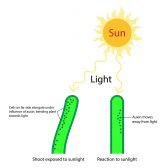Definition
noun
(general) The state, act, or process of lengthening
Supplement
In general, the term elongation refers to the state, act, or process of lengthening. In biology, the term often denotes to a biological process where a biological entity is lengthened. For instance, translation, a step in protein biosynthesis wherein the genetic code carried by mRNA is decoded to produce the specific sequence of amino acids in a polypeptide chain, includes elongation step. Translation begins when a small subunit of the ribosome binds to the 5′ end of mRNA with the help of initiation factors. This is referred to as the initiation step. This is followed by the elongation step. That is when the next aminoacyl-tRNA in line binds to the ribosome along with GTP and an elongation factor). This step is followed by termination, i.e. when the A site of the ribosome encounters a stop codon. The elongation step is also a part of the gene transcription process (the process of transcribing or making a copy of genetic information stored in a DNA strand into a complementary strand of mRNA).
In radiobiology, elongation is a parameter indicating the degree to which the cross-section of a toroidal plasma is non-circular. Kappa=b/a, where b and a are the vertical and horizontal minor radii. As kappa is increased, the confinement in relation to the total current improves, but the plasma also becomes more and more unstable to vertical displacements. A circular plasma has kappa of 1, a common value for elongated plasmas is 1.7, and the absolute limit is probably around 2.
Related term(s):
- Sign of elongation
- Elongation factor
Related form(s):






